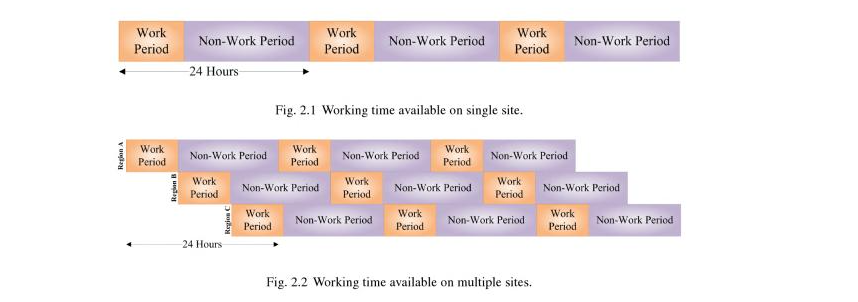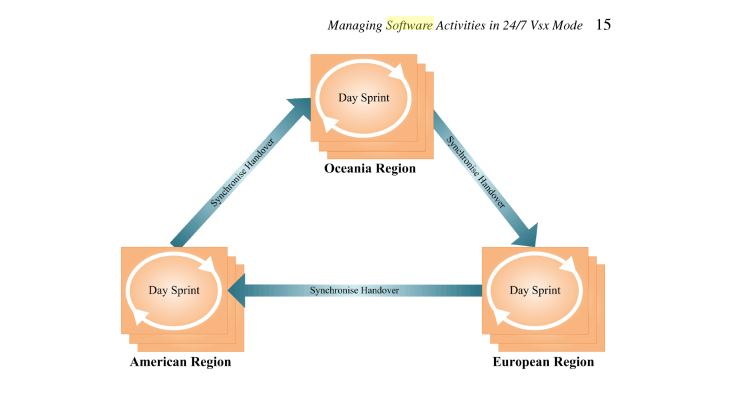We work 8 hours a day. Is it possible to set up 24/5 production of an intellectual product?
The branding company was tasked with developing competitive advantages. During brainstorming, an interesting idea was voiced: to establish round-the-clock production of the product. I want to tell you more about her.
Multiple shift work is not a new idea. In the IT world, work in 2-3 shifts takes place in call centers. Often technical support is provided in other time zones, the quality of which is often joked in series. News agencies also work on this principle.
So, for example, IT crowd makes fun of the French support.
And South Park is mocking support for the Oculus Rift, supposedly located somewhere in India.
Okay, news agencies and call centers are already working 24 hours a day. But is it possible to apply such a model to other businesses where an intellectual product is manufactured? A business working on this model will be able to increase the speed of product creation up to three times.
There was a presentation in which it was proposed to establish such a mode of work in an advertising agency in Sweden. Moreover, all shifts would be worked out in one in the office:
In my opinion, for Sweden this model is not the most successful due to the high compensation for night shifts. But what if the advertising company had representative offices in two other time zones? Could, at the end of the shift, make a full-fledged brief to colleagues from another office, where the work is just beginning?
Many IT companies are already working with distributed teams, including GitHub, Basecamp, WooThemes, Buffer. Do they take advantage of the fact that 24 hours a day?
Suppose a programmer is working on a task, and in the last hour of work he connects a colleague from another office on Skype to enter the context and short pair programming. This solution will be costly, but a customer who cares about speed can appreciate such productivity.
Here, of course, the question of communication costs arises. Can an employee transfer a task to a colleague in another office quickly and without losing important information?
In the course of writing the post, I received answers to some questions. The book “Stealing Time: Exploration in 24/7 Software Engineering Development” was found on the Internet, which proposed a 24/7 scheme for continuous software development. The book describes the situation with three offices in different time zones. The offices are located just in such a way that three shifts are worked out sequentially for a day:

Scrum methodology is proposed for project management. In each location, a 1-day sprint takes place, and then synchronous transmission for another location takes place. The transfer is a daily meeting (daily scrum).

The book writes that three offices in different time zones are an excellent scheme. If there is an urgent and terrible bug, then it can be fixed urgently.
On my own, I want to add the consideration that production is accelerating even more than three times. If the project takes 7 business days and starts on Monday, taking into account the weekend, the project will take 9 calendar days. And with three offices, such a project will be released in just three calendar days. Well, 24/7 is still working too much, 24/5 is enough.
Judging by the book, smart products can be created around the clock in different time zones, thanks to globalization for that. I do not have my own experience in participating in such projects, so it is very interesting to hear the opinion of readers on this topic, especially PMs. How many hours per day do your projects have?
Multiple shift work is not a new idea. In the IT world, work in 2-3 shifts takes place in call centers. Often technical support is provided in other time zones, the quality of which is often joked in series. News agencies also work on this principle.
So, for example, IT crowd makes fun of the French support.
And South Park is mocking support for the Oculus Rift, supposedly located somewhere in India.
Okay, news agencies and call centers are already working 24 hours a day. But is it possible to apply such a model to other businesses where an intellectual product is manufactured? A business working on this model will be able to increase the speed of product creation up to three times.
There was a presentation in which it was proposed to establish such a mode of work in an advertising agency in Sweden. Moreover, all shifts would be worked out in one in the office:
In my opinion, for Sweden this model is not the most successful due to the high compensation for night shifts. But what if the advertising company had representative offices in two other time zones? Could, at the end of the shift, make a full-fledged brief to colleagues from another office, where the work is just beginning?
Many IT companies are already working with distributed teams, including GitHub, Basecamp, WooThemes, Buffer. Do they take advantage of the fact that 24 hours a day?
Suppose a programmer is working on a task, and in the last hour of work he connects a colleague from another office on Skype to enter the context and short pair programming. This solution will be costly, but a customer who cares about speed can appreciate such productivity.
Here, of course, the question of communication costs arises. Can an employee transfer a task to a colleague in another office quickly and without losing important information?
In the course of writing the post, I received answers to some questions. The book “Stealing Time: Exploration in 24/7 Software Engineering Development” was found on the Internet, which proposed a 24/7 scheme for continuous software development. The book describes the situation with three offices in different time zones. The offices are located just in such a way that three shifts are worked out sequentially for a day:

Scrum methodology is proposed for project management. In each location, a 1-day sprint takes place, and then synchronous transmission for another location takes place. The transfer is a daily meeting (daily scrum).

The book writes that three offices in different time zones are an excellent scheme. If there is an urgent and terrible bug, then it can be fixed urgently.
On my own, I want to add the consideration that production is accelerating even more than three times. If the project takes 7 business days and starts on Monday, taking into account the weekend, the project will take 9 calendar days. And with three offices, such a project will be released in just three calendar days. Well, 24/7 is still working too much, 24/5 is enough.
Judging by the book, smart products can be created around the clock in different time zones, thanks to globalization for that. I do not have my own experience in participating in such projects, so it is very interesting to hear the opinion of readers on this topic, especially PMs. How many hours per day do your projects have?
